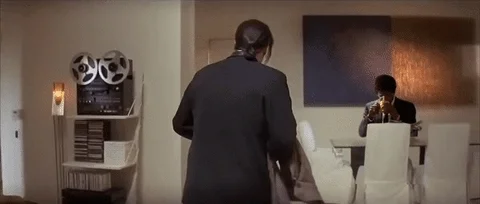COMEDY COURSE HOME | COMEDY BASICS | COMEDY WRITING | COMEDY PERFORMANCE | THE COMEDY BUSINESS | PRO COMEDIAN TIPS | HISTORY OF COMEDY | OTHER RESOURCES & MISC BITS

12 Week Free Comedy Course – Week 2
Click HERE for the course intro and other chapters:
Look back at Week 1!
Congratulations on making it to Week Two!
Did you get up on stage last week?
If so then give yourself a round of applause because you’ve done something that most people only dream about – you performed stand-up comedy!

Right enough praise, Put down your participation trophy and get ready to grind.
But before we dive in, let’s go over the answers to last week’s video questions.
We asked you to watch “Midlife Vices” and answer some Qs!
Everyone would’ve had different answers to those Qs because of course comedy is subjective, BUT Giraldo is a master.
In Midlife Vices he showcases everything that makes up great comedy: a strong point of view, an energetic and compelling performance, and engaging writing. It’s a tour de force.
If there were parts of the special that didn’t resonate with you, don’t worry. We have many clips of wildly different styles coming up, and I’m sure you’ll find something that aligns with your tastes.
Many comedians can be equally good, and not everyone will enjoy all of them.
Comedy is just Grinding

By now, you should have performed stand-up comedy three times.
Please wait until you’ve done those three sets before moving forward.
Pushing on ahead won’t be as beneficial without the experience on stage.
Getting up less than three times a week means that memory fades, and you’ll find yourself relearning lessons that don’t stick.
It seriously hampers your growth rate.
If you’re serious about stand-up and it goes beyond a hobby, you may need to consider adjusting your work schedule or even relocating to a city with more opportunities.
Right, now we’ve got that out the way let’s dive in.
Task 1: Reflect on Last Week

Think back on this week! Answer these questions as honestly as possible!
- How did it feel to go on stage?
- What did you enjoy?
- What did you not enjoy?
- Who was your favourite performer of the night?
- Why?
Who was your favourite comic?
Reflect on all the acts you saw this week! Identify which was your favourite and just like we did with Midlife Vices, answer the same questions about them.
Even at this level you might notice some similarities to Greg, there’ll definitely be some differences though!
Who was your least favourite comic?
And why? You don’t have enough time to learn from all of your mistakes so learn from theirs!
- How would you describe the comic’s stage character, that is to say, the personality they present in their act?
- Were the jokes presented as true stories from life? Or clearly false “jokes?”
- Why do you think you didn’t laugh?
- Did anything work in their act? Why do you think those bits worked and not the others?
- How did the comic’s use of their body fail to get laughs?
- How did the comic’s use of their face fail to get laughs?
- How did their voice work fail to get laughs?
- What did you notice that made their act uniquely unappealing?
- How did the comic structure the jokes that they wrote?
Task 2: Write More!

No one else is going to write your material for you so keep a notebook or use your notes app on your phone and throughout this week we want you to record every single thing you think, see or experience that makes you LAUGH.
We said it last week but we’ll say it again:
WRITE THE WHOLE IDEA DOWN
A lot of the time one or two key words are NOT enough.
Set Aside Time To Expand
Once a week, find a regular time to form these thoughts into actual jokes!
Ask yourself why you thought it was funny, and why someone laughed when you said it.
Add in the information the audience need to make sure they get it.
Task 3: Refresh Last Week’s Jokes

Pull out all the jokes you told last week and make a title for them.
Now list them in the way you performed them.
Now it’s time to score them.
Did any of them work?! If so, CONGRATULATIONS that’s something that not many people experience first time out.
From scratch. You thought of something, you performed it, and people laughed.
That moment is the basic building block of stand-up comedy, and you proved you can make it happen
Did none of them work?! Don’t worry, and maybe even get used to it!
Most comics bomb their first set, and all of them bomb at some point.
Now we just have to figure out why they didn’t work.
We deliberately didn’t adjust them last week so that you could get a true reflection on things.
When a joke fails it’s one of two things:
WRITING OR PERFORMANCE
Let’s look at performance first.
Record Your Set!
To properly study your performance you need to view your set. so RECORD IT.
Look at your pacing, listen to your voice, are the jokes being heard, are you moving stiff, are you anxiously pacing and can the audience tell!
These are all things that can have a HUGE impact on if jokes land, even before you think about the jokes themselves!
Task 4: Get Comfortable Being Uncomfortable

To help improve your performance you need to be comfortable on stage.
To do this you need to know what it feels like to be uncomfortable so we’re asking you to do one simple thing.
Next time you perform, take 5 seconds before you say anything. Let the audience get used to looking at you.

That’s it. It will feel like an eternity to you, but it won’t for them! And it gives them time to establish some context and you’ll look more confident than just anxiously rushing into things.
If you have a specific character that you want them to see, you will want to be in character during this moment as well.
If not, just be yourself and let them get used to that.
Five seconds won’t be how you’ll start every set from here on out, but just getting used to that early doors can set you up for success!
Take it a little further
After you’ve done the 5 seconds, we want you to up it to 10.
Longer, scarier, much less comfortable!
We’re only asking you to do this ONCE. Without using your words try to convey to the audience who you are as you get on stage, aim to convey confidence too, fake it til you make it!
This exercise is about building toughness.
You’ll get used to standing there in silence so that you’re not afraid of it, later in your career you will lose crowds but there is a way to bomb comfortably!
Task 5: Let’s Think About Writing

If your jokes aren’t connecting with the audience despite your comfort and competence on stage, it’s time to examine your writing.
Ensure your jokes are well-constructed; sometimes nerves can play a part.
Remember, there’s no one “right way” to write comedy; you’re free to explore any topic or perform it in your unique style, but ultimately, it must be a joke.
All jokes share two key elements: a setup that creates an expectation and a surprise in how that expectation is fulfilled.
Consider this short joke by Dave Attell, where he cleverly plays with the double meaning of “back” to surprise the audience.
“I used to drink a lot,” says Dave Attell to the crowd, in a knowing tone like he’s over it now,“but that was way back… there.” He points to the bar in the back of the club.
In this joke we can see a clear set up and punch! A classic joke writing structure, the expectation is that he’s talking about time and he shatters it with the “back there”.
Seasoned comedians can execute this art so subtly that it’s almost imperceptible, but those elements are always present.
Start with the basics; conquering them will pave the way to more intricate comedic brilliance.
Let’s Look At Jeselnik
Let’s analyse some jokes, focusing on Anthony Jeselnik’s exceptional joke-writing style.
To understand why his jokes work, follow these steps:
- Watch Anthony Jeselnik’s set on “Just For Laughs 2012” to answer the same questions as you did for Greg Giraldo.
- Write out Anthony’s jokes word for word and identify the punchline – the group of words with the most surprising element that fulfills the audience’s expectations with an unexpected twist.
- For each joke, explore what Anthony led you to expect and how he achieved this.
- Analyse what he gave you instead and pinpoint the unexpected element in the resolution.
- Apply the lessons learned to your own jokes from last week: ensure clarity in the audience’s expectations and strategically place the surprising element after providing all the necessary information for it to work effectively.
Remember, this doesn’t mean copying Jeselnik’s style, but rather identifying the key elements of joke structure and incorporating them into your own unique approach.
Task 6: Get Ready To Get Back On Stage

Get ready to shine on three more open mic nights!
Take out the jokes that received laughs from last week’s performance, and jot them down at the top of your set list for this week.
These jokes have already proven their comedic value, and opening with them will establish an immediate rapport with the audience, making them more receptive to the rest of your set.
Starting your act with tried-and-true material not only boosts your confidence but also helps you quickly gauge the audience’s mood and responsiveness.
It’s like a litmus test for the room’s vibe.
By beginning with something that reliably gets laughs, you can get a read on the crowd and adjust your approach accordingly.
This way, you’re not stepping into unknown territory, feeling anxious about testing new material right from the start.
Instead, you exude confidence, and the audience becomes comfortable more swiftly.
However, while using successful jokes is a solid strategy, don’t shy away from refining them further.
As you look at the jokes that worked last time, consider ways to make them even better.
Maybe the setup line can be trimmed down, delivering the punchline more swiftly and surprising the audience with the twist.
Remember, brevity is a friend in comedy, but that doesn’t mean you should sacrifice vividness and specificity.
Brevity Is The Soul Of Wit
Speaking of punchlines, their succinctness is crucial for delivering the maximum impact.
Think of the punchline as the moment when the audience’s expectations are fulfilled in a surprising and humorous way.
The quicker this happens, the bigger the punch! For instance, take a cue from Paul F. Tompkins’ brilliant joke: “I love amusement parks…I think because I hate money.” In just a few words, he sets up the expectation and delivers the punch, leaving the audience roaring with laughter.
Balancing brevity and colourful language is an art.
While concise words keep the audience engaged, bland and generic terms may fall flat.
So, choose your words carefully and consider if a more vivid description can add flavour to your jokes.
Maybe swapping “car” for “rust-bucket” or “82 Fiero” could make the difference between an ordinary joke and one that paints a memorable picture in the audience’s minds.
Elicit Emotional Responses
Now, let’s delve into the emotional aspect of your jokes.
Your delivery should convey your point of view clearly.
The audience needs to understand how you feel about what you’re saying, whether it’s love, hate, amusement, or frustration.
This emotional connection enhances the impact of your jokes and helps build a stronger rapport with the crowd.
Make sure your writing and stage performance align to convey your intended emotional perspective effectively.
Of course, while refining your jokes and performance, don’t overthink it. If something worked well last time, trust that it will work again.
Comedy is an art of experimentation, but also of embracing what works.
If any changes resonate with you, go ahead and implement them, but don’t hesitate to revert to proven material if a tweak doesn’t hit the mark.
Remember, the ultimate goal is to entertain and leave the audience in stitches, so trust your instincts and unique comedic style to shine on stage!
Task 7: Make an “In The Shop” List

As you work through this week and try your jokes, don’t throw away any that don’t work.
Instead set them aside to a IN THE SHOP list, where you can work on them more.

Some Jokes take months and even years to perfect.
Always try a joke at least 3 times before editing, if it gets ANYTHING those three times, there’s something there.
Work on it, take it out to gigs, work on it, etc etc etc.
And get back to it!
Just like last week, try go for more open mics!
There’s a lot to think about but you got it. Comedy is about showing up every day.
This was a pretty heavy week but if you’re going to succeed you’ve got to put in the work.
That’s it! That’s Week Two.
See you back again here in a week!
This is an adaptation of the free 12week course Jon Roy offers HERE

Learn more about the Comedy Basics here
COMEDY BASICS
























